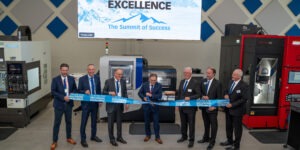'SCRAPPING' THE SCRAP REMOVAL PROBLEM
The story of how conveyor builder Magnetic Products helped one Midwest manufacturer overcome an unusually high drop from the pass line onto the scrap removal conveyor of its recently installed press.
Posted: August 10, 2010
Removal of scrap metal is a vital, constant and costly function faced by plant managers worldwide. Untimely removal of scrap can endanger workers and damage machinery. Storage of traditional scrap bins on factory floors reduces overall available manufacturing space, as well as being unsightly. Despite declining monetary and human resources, plant managers must ensure that scrap metal is removed in a timely and reliable manner.
A major Midwestern manufacturer decided to install a new press with an unusually high drop from the pass line of the press to the scrap removal conveyor. This presented a number of challenges. One, the conveyor had to keep up with an extremely high volume. Two, each piece of scrap was over a foot long. Three, the angle of incline had to be extremely steep to accommodate the plant?s current deep pit.
The company debated the merits of a steel hinge conveyor versus a magnetic conveyor. In this case, it was determined that the magnetic conveyor was clearly the right choice. The magnetic conveyor would offer a substantial costs savings and improved performance as compared to its steel-belted counterpart. Furthermore, the manufacturer would not have to deal with slide back or ?cascading? scrap, or wedging scrap, which commonly leads to the early demise of steel conveyors. The manufacturer contacted Magnetic Products, Inc. (MPI; Highland, MI), a provider of both magnetic and non-magnetic material handling solutions.
After extensive testing in its in-house research facility, MPI recommended its Series 1200 beltless magnetic conveyor, which seemed to be the right solution to the challenges at hand. The beltless magnetic conveyors provide positive control of ferrous metal materials. Powerful permanent magnets are conveyed below a nonmagnetic stainless steel slider bed to move and convey ferrous metal objects. BLM conveyors are available in a variety of sizes with many design options and can be supplied with other ancillary components, such as feeders and hoppers, to provide a complete material handling system. The manufacturer offered complete demolition of old equipment and installation services.
What resulted was, at the time, the largest BLM ever built by this manufacturer. Operating on a 24/7 schedule, the conveyor has flawlessly processed 6.5 lb of scrap per stroke for seven years. That equates to over 10,000,000 lb of scrap. Five years after the initial installation, the same manufacturer faced another challenge. The plant now required a conveyor that was able to handle an even bigger load: 8 lb of scrap per stroke. The solution was another beltless magnetic conveyor that, this time, measured 24 in wide, 35 ft long and 20 ft tall with an 18 ft in-feed. The conveyor featured:
? powerful Ceramic 8 magnet material
? an internal oil reservoir allows for continuous lubrication
? a reinforced impact bed designed to perform consistently in extremely rugged environments
? a self-adjusting chain tensioning system
? 7 gauge stainless steel slider beds
? 7.5 hp 230/460V 3-phase motor with gear reducer and torque limiter
?That conveyor was a monster.? remarked Barry Tackett, an MPI customer service representative. ?We had to ship it on a flat-bed. It was too big to fit in a semi-trailer.? This BLM conveyor has also operated 24/7 over 18 months without incident and without downtime. www.mpimagnet.com














